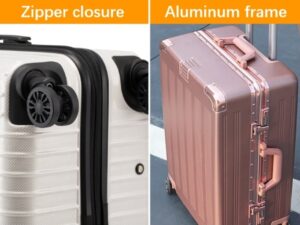As a leading luggage manufacturer in China, we understand the materials you choose is crucial to producing high-quality, competitive products. Whether you are a designer creating innovative luggage designs, a brand owner expanding your product offerings, or a distributor seeking reliable options, the material selection can make or break your success. In this guide, we explore 4 common materials used in luggage manufacturing: Polypropylene (PP), Acrylonitrile Butadiene Styrene (ABS), Polycarbonate (PC), and Aluminum. By understanding the unique properties of each material, you can make informed choices that meet both your business needs and the expectations of today’s travelers.

Polypropylene (PP) luggage
Polypropylene (PP) is a thermoplastic polymer widely used in the luggage industry due to its unique combination of properties. Here’s a closer look at why PP is a popular choice for suitcase manufacturing:
- Lightweight: PP is a relatively light plastic,with a density of only 0.89~0.91g/cm³
- Durability: PP offers excellent impact resistance.
- Cost-effective: PP material is more affordable than PC or Aluminum.
- Flexibility: PP is naturally flexible, allowing it to absorb impacts without cracking.
ABS luggage
Acrylonitrile Butadiene Styrene (ABS) is another widely used thermoplastic polymer in the luggage industry. Known for its balance between strength, cost, and weight, ABS is often used in hard-shell luggage. Here’s what makes ABS a popular material:
- High rigidity: ABS provide good protection of the luggage.
- Easy to mold: ABS is highly versatile in manufacturing, allowing for a wide variety of shapes and designs.
- Wear resistance: ABS has good wear resistance.
- Various surface finishes: ABS can hold colors well, and can be made in different texture.
PC luggage
Polycarbonate (PC) is a high-performance plastic known for its exceptional strength and durability, making it a popular choice for premium luggage. Here’s why PC is highly regarded in the luggage industry:
- Superior impact resistance: PC is one of the most impact-resistant material used in luggage production. It can withstand rough handling, drops, and other stresses that occur during travel, protecting the contents inside the suitcase.
- Flexibility and elasticity: PC has a natural elasticity that allows it to flex under pressure without cracking or breaking.
- Lightweight: PC is surprisingly lightweight, offering a good balance between durability and ease of transport. This makes it an ideal choice for travelers who need sturdy luggage without added weight.
- Aesthetic appeal: PC is easy to mold and can be produced in a variety of finishes, from glossy to matte, and in a wide range of colors. This allows for stylish designs that appeal to a broad market.
Aluminum luggage
Aluminum is a premium material often associated with luxury and durability in the luggage industry. Known for its robustness and distinctive appearance, aluminum luggage stands out as a top choice for travelers seeking both style and substance. Here’s a detailed look at the features of aluminum luggage:
- Exceptional durability: Aluminum offers superior protection for the contents inside.
- Fire and water resistance: Aluminum is naturally resistant to fire and water, offering excellent protection against extreme conditions. This makes it a preferred choice for travelers who need extra security for their belongings.
- Premium aesthetic: Aluminum luggage is synonymous with luxury and style. Its sleek, metallic finish is often associated with high-end brands and is favored by those who appreciate a sophisticated, professional appearance.
- High impact resistance: Aluminum can withstand significant impact without cracking or breaking, which makes it highly resilient to the rough handling that often occurs during air travel.
In conclusion, selecting the right material for your luggage is crucial, whether you’re designing a new product line, enhancing your brand’s offerings, or distributing to a discerning market. Each material—PP, ABS, PC, and Aluminum—offers unique benefits and challenges. Polypropylene (PP) stands out for its lightweight and affordability, making it ideal for cost-effective, flexible luggage. ABS provides a balance of strength and value, suitable for budget-conscious consumers who still require durability. Polycarbonate (PC) is favored for its exceptional impact resistance and sleek aesthetics, perfect for premium products. Finally, Aluminum represents the pinnacle of luxury and robustness, offering unmatched protection and a timeless design. By understanding these materials’ properties, you can make informed decisions that align with your brand’s goals and meet the diverse needs of travelers today.

